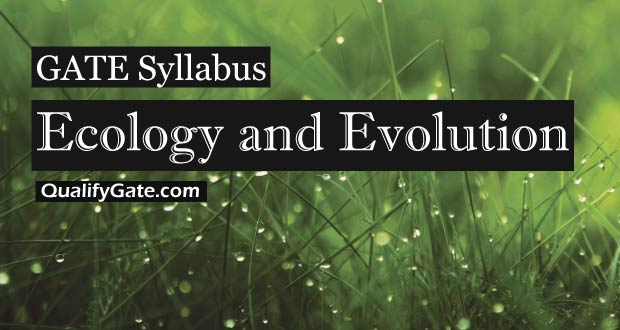PDF download link of GATE 2021 Syllabus for Ecology and Evolution (EY) is given in the end of the article.
Syllabus for General Aptitude (GA) (common to all papers)
Section 1: Ecology
Fundamental concepts: Abiotic and biotic components; scales (population, species, community, ecosystems, biomes); niches and habitats.
Population ecology: Population growth rates (density dependent/independent); metapopulation ecology (colonization, persistence, extinction, patches, sources, sinks); age-structured populations.
Interactions: Types (mutualism, symbiosis, commensalism, competition, parasitism, predation, etc); ecophysiology (physiological adaptations to abiotic environment); prey-predator interactions (Lotka-Voltera equation etc)
Community ecology: Community assembly, organization and succession; species richness, evenness and diversity indices, species-area relationships; theory of island biogeography Ecosystems structure and function: trophic levels and their interactions; nutrient cycles; primary and secondary productivity.
GATE 2021 Syllabus for Ecology and Evolution
Section 2: Evolution
History of Evolutionary thought: Lamarckism; Darwinism; Modern Synthesis
Fundamentals: Variation; heritability; natural selection; fitness and adaptation; types of selection (stabilizing, directional, disruptive)
Diversity of life: Origin and history of life on earth; diversity and classification of life; systems of classification (cladistics and phenetics)
Life history strategies: Allocation of resources; tradeoffs; r/K selection; semelparity and iteroparity
Interactions: Co-evolution (co-adaptations, arms race, Red Queen hypothesis, co-speciation); prey-predator interactions (mimicry, crypsis, etc)
Population and Quantitative genetics: Origins of genetic variation; Mendelian genetics; HardyWeinberg equilibrium; drift; selection (one-locus two-alleles model); population genetic structure (panmixia, gene flow, FST); polygenic traits; gene-environment interactions (phenotypic plasticity); heritability
Molecular evolution and phylogenetics: Neutral theory; molecular clocks; rates of evolution; phylogenetic reconstruction; molecular systematics
Macroevolution: Species concepts and speciation; adaptive radiation; convergence; biogeography.
GATE 2021 Syllabus for Ecology and Evolution
Section 3: Mathematics and Quantitative Ecology
Mathematics and statistics in ecology: Simple functions (linear, quadratic, exponential, logarithmic, etc); concept of derivatives and slope of a function; permutations and combinations; basic probability (probability of random events; sequences of events, etc); frequency distributions and their descriptive statistics (mean, variance, coefficient of variation, correlation, etc).
Statistical hypothesis testing: Concept of p-value; Type I and Type II error, test statistics like t-test and Chi-square test; basics of linear regression and ANOVA.
Section 4: Behavioural Ecology
Classical Ethology: Instinct; fixed action patters; imprinting; learnt behavior; proximate and ultimate questions
Sensory ecology: Neuroethology; communication (chemical, acoustic and visual signaling); recognition systems
Foraging ecology: Foraging behaviour; optimal foraging theory
Reproduction: Cost of sex; sexual dimorphism; mate choice; sexual selection (runaway selection, good-genes, handicap principle, etc); sexual conflict; mating systems; parental care
Social living: Costs and benefits of group-living (including responses to predators); effect of competition (scramble and contest) on group formation; dominance relationships; eusociality; kin selection; altruism; reciprocity; human behaviour.
GATE 2021 Syllabus for Ecology and Evolution
Section 5: Applied Ecology & Evolution
Biodiversity and conservation: Importance of conserving biodiversity; ecosystem services; threats to biodiversity; invasive species; in-situ conservation (endemism, biodiversity hotspots, protected areas); ex-situ conservation; conservation genetics (genetic diversity, inbreeding depression); DNA fingerprinting and DNA barcoding.
Disease ecology and evolution: Epidemiology; zoonotic diseases; antibiotic resistance; vector Control Plant and animal breeding: Marker assisted breeding; genetic basis of economically important traits.
Global climate change: Causes; consequences; mitigation.

